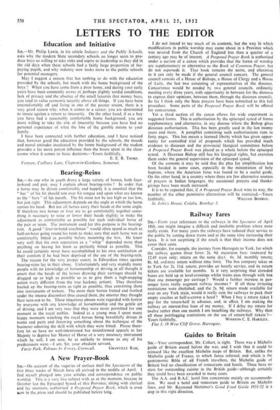Bearing-Reins
SIR,—As one who in youth drove a large variety of horses, both four- in-hand and pair, may I explain about bearing-reins ? In order that a horse may be driven comfortably and happily it is essential that the " bar " of his bit should rest over his tongue and upon what are known as the - bars " of his mouth. The bit must not be too high or too low, but just right. This adjustment depends on the angle at which the horse carries his head. But not all horses carry their heads at the same angle. If therefore two horses or four are to go comfortably together some- thing is necessary to raise or lower their heads slightly to make the adjustment as comfortable as possible for each individual horse of the pair or team. The instrument used for this purpose is the bearing- rein. A good " four-in-hand coachman " would often spend as much as half-an-hour going round his team to make sure that each horse was as comfortably bitted as possible before mounting the box. He knew very well that his own reputation as a " whip " depended more than anything on having his team as perfectly bitted as possible. This he could certainly never have accomplished to his own satisfaction or their comfort if he had been deprived of the use of the bearing-rein.
The reason for the very proper outcry in Edwardian times against bearing-reins lay in their abuse. Unfortunately and very stupidly many people with no knowledge of horsemanship or driving at all thought it smart that the heads of the horses drawing their carriages should be dragged up as high as possible so as to give them a high-stepping action (very different from the true hackney action). They therefore hauled up the bearing-reins as tight as possible, thus converting them into instruments of torture. The more their horses fretted and frothed under the intense discomfort thus caused them, the smarter they thought their turn-out to be. These iniquitous abuses were regarded with horror by everyone with any knowledge of horsemanship and the gentle art of driving, and I am very sure that they were never permitted for one moment in the royal stables. Indeed as a young man I spent many happy moments watching the royal horses being beautifully driven in teams and pairs and (knowing something about the technique of the business) admiring the skill with which they were bitted. Please there- fore let us have no well-intentioned but misinformed appeals to her Majesty to deprive her Master of Horse of a very necessary instrument which he will, I am sure, be as unlikely to misuse as any of his predecessors were.—I am, Sir, your obedient servant,
Furze Park, Polruan by Fowey, Cornwall. GRANVILLE RAM,


































 Previous page
Previous page